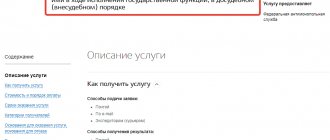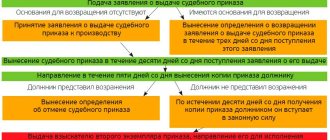An important factor that influences the practice of using simplified proceedings is the mandatory nature of its use. If there are mandatory conditions, the court does not require the consent of the parties. They cannot refuse to consider the case through summary proceedings. We will tell you what needs to be done so that the claim is not considered without your participation through summary proceedings against your will. It is important not to miss the deadline for refusing to consider a dispute in summary proceedings and to challenge an unexpected decision in a timely manner.
Review procedure
The actions of a judge who has received a statement of claim in a case that falls under the “simplified” or does not fall under, but there is a statement from the plaintiff, are as follows:
1. After the judge has accepted the case for proceedings in an abbreviated manner, the court sends the parties a ruling in which it is proposed , explanations and evidence to each other within a period of at least 15 days (calendar)
2. In the ruling on accepting the case, the court also indicates the date until which the participants have the opportunity to object to the abbreviated proceedings by sending additional documents and objections to the court and the parties within the period established by the ruling (at least 30 calendar days from the date of the ruling, and not less than 15 days from the previous set date).
In this case, it is important to submit to the court confirmation that all parties to the dispute have been sent an additional package of documents that was submitted to the court. Without such confirmation, the court has the right not to accept additional evidence until it is convinced that it has also been sent to the other party. Absolutely new documents that were not discussed in the evidence presented earlier cannot be presented under the guise of additional ones.
Objections regarding the order are drawn up in free form , they indicate the reasons for disagreement and (or) with an abbreviated order:
To the Leninsky District Court of Samara
Defendant Ponomarev E.N., living in Samara, st. Gribova, 43, apt. 5 Tel. 899373737
according to the claim of Krasnov P.E. to Ponomarev E.Sh. on reclaiming property (civil case No. 2652562)
OBJECTION to simplified procedure (sample)
At the request of the plaintiff Krasnov P.E., who filed claims against me, Ponomarev E.Sh., to recover property from my possession, a ruling dated August 21, 2021 was issued to assign the case under summary proceedings.
Since the Plaintiff has significantly increased the demands, in connection with which I will present new calculations, as well as witnesses, I consider it impossible to make a decision on the claim of Krasnov P.E. in this order.
Based on the above, guided by art. Art. 232.2-232.4 Code of Civil Procedure of the Russian Federation,
ASK:
Consider the statement of claim of Krasnov P.E. to Ponomarev E.Sh. on the recovery of property, in civil case No. 2652562, in the general procedure for claim proceedings. The ruling on assigning the case in summary proceedings is cancelled.
Ponomarev E.Sh., number, signature
It is clear that most often objections are sent to the court on behalf of the defendant, because plaintiffs are more interested in the speedy satisfaction of their claims in the form in which they are stated. At the same time, in cases where the plaintiff needed to provide new evidence, conduct an examination, make additional calculations and clarify requirements, a statement of claim to transfer to the general procedure or a petition can be submitted to the court and from it:
To the Leninsky District Court of Samara
Plaintiff Krasnov P.E., living in Samara, st. Mamaeva, 4, apt. 51 Tel. 894545455465
according to the claim of Krasnov P.E. to Ponomarev E.Sh. on the recovery of property from illegal possession and recovery of the amount (civil case No. 2652562)
Petition for withdrawal from simplified proceedings
Based on my petition in civil case No. 265262, the court issued a ruling dated August 21, 2021 to appoint the case through summary proceedings.
Since at present, taking into account inflation and the non-recognition of the claim by the defendant, I need to clarify the claims and appoint an additional assessment examination, it became necessary to move to the general procedure for the proceedings on my claim against Ponomarev E.Sh. about reclaiming property.
Based on the above, guided by art. Art. 232.2-232.4 Code of Civil Procedure of the Russian Federation,
ASK:
Consider civil case No. 265262 on my claim against Ponomarev E.Sh. on the recovery of property from illegal possession in the ordinary course of legal proceedings. The ruling on assigning the case in summary proceedings is cancelled.
Krasnov P.E., number, signature
Most often, the plaintiff submits such a petition after receiving a written disagreement with the claims from the defendant. Thus, the plaintiff understands that he will have to prove the legality and validity of his claims, which means he will have to consider the dispute in a general manner.
In the event that an objection or petition is received by the court within the period established by the court in the ruling, the summary proceedings are canceled and the proceedings begin from the very beginning. At the same time, if the court has moved to the usual procedure only because it is necessary to order an examination or examine evidence, there may be a transition without returning to the initial stage of the appointment, the consideration procedure will continue.
If objections are received by the court outside the time limits established by the ruling, but before a decision is made, the court may accept them if it is convinced that the reason for the omission is valid. Otherwise, if there is no such good reason, the documents are returned and a determination is made. If objections regarding the shortened proceedings were received by the court after the decision was made, the appeal procedure is explained to the applicant, and the documents are returned.
The law does not prohibit the parties from filing petitions, sending them to the court and sending copies to other participants. The court resolves such petitions without the participation of the parties, a ruling is issued, a copy is sent for review (for example, a petition to request information from a government agency that is relevant to the case);
3. The general period for simplified consideration is 2 months for the court from the date of receipt of the claim by the office. If for some reason the court does not have time to make a decision or, due to workload, does not have time to complete it within 2 months, a decision may be made to move to the general procedure. The procedural law does not prohibit the court from setting additional deadlines (except for 15 and 30 days) during which additional evidence may be provided.
4. If, before the decision on the case, the court does not have information about the receipt by the parties of a copy of the ruling on the assignment of the case sent to them, the transition to the general procedure is carried out. The same thing happens if information has been received, but it shows that the parties did not have time to familiarize themselves with the case materials (for example, due to a long illness).
5. The parties have the right to express a desire to conclude a settlement agreement. To do this, the court, without going into general procedure, sets a date when such an agreement is supposed to be approved. If approval does not take place on this day, then a ruling is made to consider the case in ordinary litigation proceedings.
6. Before the expiration of the two-month period, but after the deadlines established for the parties, the court must make a decision (its operative part). Only upon application or in case of appeal, the same judge who announced the operative part is obliged to draw up a reasoned decision. The application is submitted within 5 days from the date of signing the operative part:
To the Petrovsky District Court of Syzran, Judge Popova E.N.
Plaintiff Rabbi K.A., living in Syzran, st. Kitaeva, 2, apt. 12
In civil case No. 42424 according to the claim of Rabbi K.A. to Molchanov M.I. on debt collection
STATEMENT on making a full reasoned decision on the case
Based on the results of the consideration of civil case No. 42424 in my claim against M.I. Molchanov. a decision was made to forcibly collect the amount of debt from the defendant, the operative part of which was issued on August 27, 2021.
Based on clause 2 of Art. 232.4 Code of Civil Procedure of the Russian Federation,
ASK:
Make a reasoned decision in case No. 42424, send a copy to the address indicated by me in this application.
Rabbi K.A., number, signature
From the date such an application is received by the court, the court is obliged to draw up a full, reasoned text of the decision within 5 days (calendar). If there is no application, but there is an appeal, then this period is calculated from the moment the complaint is received.
7. A short decision adopted based on the results of the abbreviated consideration shall be sent to the parties and posted on the Internet no later than the next day. Moreover, on the 15th day from the date of issuance, it comes into force if no one files a complaint.
8. A full reasoned decision, if one has been drawn up, comes into force within 15 days from the date of its production, if there are no appeals.
9. The procedure for appealing a court decision made through summary proceedings presupposes compliance with the general rules of appeal. In a higher court, an abbreviated consideration of the arguments of appeals is carried out, without summoning persons, without keeping minutes, etc. – the same as in the first instance.
What does "simplified" mean?
This procedure involves consideration of claims both in civil and arbitration proceedings using a special procedure. Article 322.1 of the Code of Civil Procedure of the Russian Federation provides that this is an ordinary consideration of a claim, but in an abbreviated version.
Many compare this procedure with writ proceedings. Indeed, the lack of a thorough examination of all the evidence, the failure to interrogate witnesses and the absence of a stage of direct proceedings with the participation of the parties makes these procedures similar, but a court order presupposes the absence of a dispute, which may well exist in an abbreviated proceeding.
In accordance with the Code of Civil Procedure of the Russian Federation, judges are allowed to apply the rules on simplified procedures for statements of claim. The Arbitration Procedure Code of the Russian Federation provides for the possibility of using a short procedure not only for claims, but also for cases of administrative and other public relations. For example, an arbitration court has the right to consider an application to challenge a decision to impose administrative liability if the sanction of the article provides for a fine of 100,000 rubles.
This procedure can be applied both by judges of general jurisdiction and arbitration courts, and by magistrates. For example, in an abbreviated proceeding, a claim for the recovery of an amount not exceeding 50,000 rubles can be considered - the decision is made by a magistrate. If the amount exceeds 50,000 rubles, then by a district judge.
Question: Is it possible to consider a case using a simplified procedure if, in addition to the parties, third parties are indicated in the claim?
Previously, judicial practice on this issue was formed ambiguously. Some judges tried to adopt a general procedure in such cases, believing that the “simplification” could in one way or another affect the rights of other participants in civil legal relations. Later, the Supreme Court of the Russian Federation, in its clarifications, indicated the possibility of a simplified review if there are already third parties in the case by the time the claim is submitted to the court office.
The abbreviated procedure is characterized by the application of the rules of claim proceedings, with the exception of the following provisions:
- persons participating in the case, including third parties, are not notified;
- the court does not issue a document scheduling a court hearing;
- the court hearing is not actually held. Consequently, recording by recording and audio recording by the secretary is not carried out;
- due to the absence of a hearing, the courts do not use the rules of adjournment, interruption in consideration, as well as the legal requirements for reasonable time limits for consideration of cases;
- The time frame for appealing and the entry into force of a decision has been reduced.
The rules of jurisdiction remain unchanged: as a general rule, a claim is filed in the court that is territorially related to the defendant’s place of residence .
For which cases a shortened procedure is possible and about its features in civil and arbitration law, read below.
Regulatory documents and explanations on the application of simplified proceedings
The main document defining simplified proceedings in arbitration courts is the Arbitration Procedural Code of the Russian Federation. Chapter 29 is entirely devoted to the application of this legal process.
The Supreme Court, by its Resolution of the Plenum of April 18, 2017 N 10 “On some issues of the application by courts of the provisions of the Civil Procedure Code of the Russian Federation and the Arbitration Procedure Code of the Russian Federation on simplified proceedings,” explained the procedure for applying simplified proceedings in two processes.
These clarifications are constantly updated, which makes it possible to keep abreast of the latest changes and interpretations of law enforcement practice. This article analyzes the rules relating specifically to the arbitration process.
When a simplified procedure cannot be applied (in accordance with the Code of Civil Procedure of the Russian Federation)
The court issues a ruling to schedule the case for hearing in the usual manner if:
- a third party entered into the dispute and declared independent demands;
- a counterclaim has been filed;
- objections have been filed by one of the parties (most often, the defendant) regarding the simplified procedure and the court agrees with the arguments about the need to move to the general one;
- the court established the need to study evidence, as well as to request additional documents, calculations, and confirmations. For example, when the origin of the disputed right is unclear from the materials provided to the court or the amount does not correspond to the facts stated in the claim;
- there is a need to order an examination, call witnesses or inspect any object at its location;
- a claim has been filed, the resolution of which may negatively affect the observance of the rights of other persons who are not parties to the case. For example, when the content of the claim includes reclaiming a car from someone else’s possession, but it is registered to another person who is not involved in the proceedings. If the court makes a decision without examining the circumstances of the purchase of the car, the danger of absentee violation of property or use rights belonging to another person remains.
In addition to the above points, under no circumstances can a case be considered in an abbreviated manner if:
- going to court is related to administrative legal relations (for example, appealing the actions of government bodies);
- the claim concerns information related to state secrets. For example, cases in which it is necessary to request documents classified as “secret”;
- the dispute affects the interests of children (claims for deprivation or limitation of parental rights);
- the case concerns compensation for harm caused to human life and health;
- applications filed under special proceedings have been filed. The list of such cases is listed in Art. 262 Code of Civil Procedure of the Russian Federation. These are statements about establishing paternity, about adoption, about recognition as incompetent, dead, missing, etc.
- as we have already written, a case that falls under the category of cases of writ proceedings cannot be considered in short. We draw attention to the following: if an order was issued, but was subsequently canceled, or the application for a court order was immediately refused, a simplified procedure is possible. In such cases, the law obliges to attach to the case copies of the materials of the writ case (application, refusal to accept, etc.).







